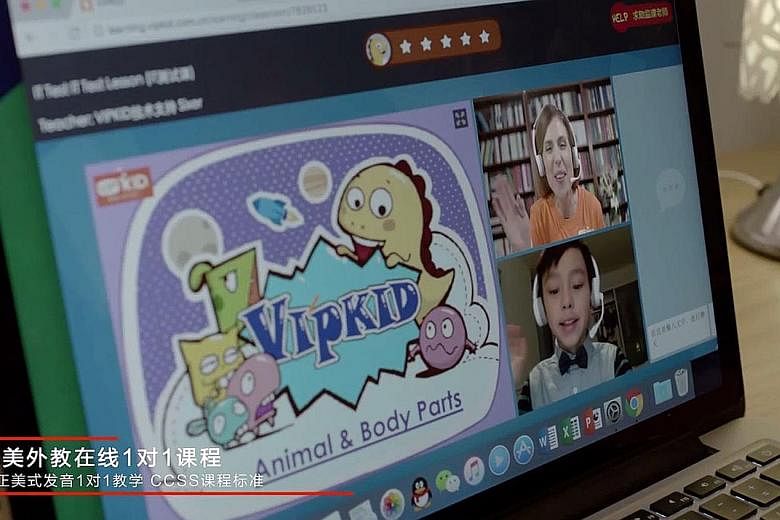BEIJING • When Ms Wu Wenhua was growing up in 1980s China, hardly anyone bothered to learn English. Now that she has a son, she believes that knowing the language is key to opening doors.
Ms Wu has signed up Ryan, 11, for an online service, called VIPKid, that connects Chinese primary school pupils with teachers in the United States for one-on-one lessons. "He recently got 99 out of 100," said Ms Wu, 38, of Ryan's test result. "He does pretty well."
Parents like Ms Wu are propelling an education boom in China that is having global repercussions.
Chinese parents have always prioritised academic achievement. Now, they have the means to invest in extra lessons, fuelling a domestic market that UBS says will double to US$165 billion (S$221 billion) in five years.
Online start-ups are gaining ground with parents who grew up in the Internet era and see advantages in digital learning. VIPKid has expanded to 200,000 students and just raised venture money at a valuation of more than US$1.5 billion from Sequoia Capital and Tencent Holdings. Shanghai rival iTutorGroup has won backing from Alibaba Group Holding and Qiming Venture Partners.
"Chinese parents have high expectations for their children; everyone wants (his) kids to get into Tsinghua or Peking University," said UBS Securities analyst Edwin Chen. "This is creating huge demand."
In China, a combination of factors has given online schools a boost: Finding good teachers can be a challenge, especially in subjects like English and in places beyond the biggest cities. For the nation's education-obsessed tiger mums and dads, it is worth the money to prepare their kids for a high-tech future.
Sceptics believe online education will probably remain a small part of the overall industry. But author Curtis Johnson, who has championed online teaching, is convinced that global adoption is coming, owing in part to experiments in countries such as China.
Chinese parents currently pay for fewer extra classes than their Asian neighbours. Last year, about 37 per cent of children in China had tuition, compared with the 70 per cent in places such as Japan, Taiwan and South Korea, according to UBS. The research firm projects that the ratio will hit 50 per cent in five years, during which time the Chinese government expects the number of kids attending kindergarten through 12th grade to swell to almost 200 million.
Traditional tuition centres are cashing in. New Oriental Education and Technology, founded by Peking University Professor Yu Minhong in 1993, is projected to reach revenue of US$2.2 billion in the current fiscal year. TAL Education has over 500 learning centres in about 50 cities and is expected to boost revenue to US$1.7 billion this fiscal year.
VIPKid has set itself apart by hiring American teachers and positioning its services as similar to the education in top US schools. The Beijing-based start-up has become one of the fastest-growing companies in the industry, with revenue on pace to reach five billion yuan (S$1 billion) this year.
Many Chinese parents see advantages in learning online: They do not have to drive their kids to a classroom across town, and there are bragging rights associated with hiring an American teacher.
Ms Gong Aihua's son, Noah, five, takes VIPKid's online classes three times a week. Pupil and teacher can see each other in squares on the computer screen's right-hand side, and they work on a digital chalkboard on the left.
Some parents, however, are doubtful. Ms Jean Liu tried several online schools but moved her daughter, eight, back to the classroom. She noticed that companies tend to feature their best teachers in ads and introductory courses. But once you sign up, the "good teachers aren't usually available", she said.
BLOOMBERG

